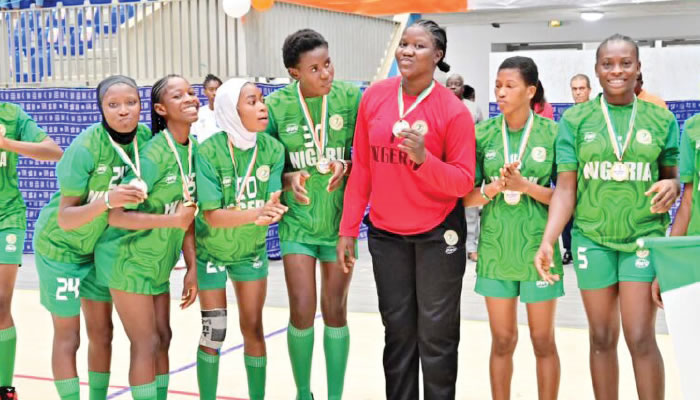Paragraph 1: Unveiling Nigeria’s U-18 and U-20 Women’s Handball Squads for IHF Trophy
Nigeria’s U-18 and U-20 women’s handball teams have finalized their rosters, each comprising 14 players, in preparation for the IHF Women’s Trophy Zonal Phase, scheduled to take place in Abidjan, Ivory Coast, from April 20th to 24th. The teams underwent rigorous training at the Rowe Park Sports Centre in Yaba, Lagos, for two weeks before embarking on their journey to Abidjan. Both teams represent Nigeria’s aspirations for success in the regional competition and showcase the country’s emerging talent in women’s handball.
Paragraph 2: Composition of the U-18 Team: A Blend of Emerging Talent
Coach John Uzor has meticulously crafted the U-18 squad, incorporating promising players from various clubs across Nigeria. Among the selected athletes are the Omole sisters, Joy and Shola, both representing Defender Babes, along with Princess Ojie from Funad Academy and the skilled right back, Faisat Balogun. The team also features dynamic players such as Success Duru, Chetachi Ngaodurubie of COAS Babes, and Sharon Okonkwo. This diverse selection reflects Coach Uzor’s strategy to combine various playing styles and strengths.
Paragraph 3: The U-20 Team: A Core of Experienced Players
Coach Shittu Agboola, at the helm of the U-20 team, has opted for continuity by retaining the core group of players he has nurtured since their U-18 days. This strategic decision underscores the importance of team chemistry and experience. Leading the charge is Captain Chidera Ogbusimba, accompanied by her Rima Queens teammates, the Samuel sisters, Amina Mohammed, and Joy Peters. The inclusion of internationally based players like Rahima Bello from Israel, Kehinde Babatunde from ASPAC HBC of Benin Republic, and Esther Mathew, also based in Benin Republic, adds depth and international exposure to the squad.
Paragraph 4: Coach Shittu’s Optimism and a Setback in Team Selection
Coach Shittu expresses confidence in the team’s ability to perform well in Abidjan, drawing inspiration from their previous successes at the U-18 level. He highlights the unfortunate absence of Taiwo Babatunde, whose school, Yaba College of Technology, declined to release her for national duty due to examinations. This decision, despite efforts to secure her release, has undoubtedly impacted the team’s plans. Coach Shittu voices his disappointment and calls for better collaboration between educational institutions and sporting bodies to prevent such situations in the future. He remains optimistic, however, emphasizing the strength of the remaining players.
Paragraph 5: The Tournament Structure and Nigeria’s Group Stage Opponents
The IHF Women’s Trophy Zonal Phase in Abidjan features both the U-18 and U-20 categories, with matches scheduled to be held at the Salle polyvalente des parcs de sport de treichville (Multipurpose Sports Hall). Nigeria’s U-18 team has been drawn into Group A, facing stiff competition from Ghana, Togo, and Burkina Faso. The U-20 team is placed in Group B, set to contend against Benin Republic and Togo. The group stage matches will provide crucial tests for both teams as they strive to advance to the knockout rounds.
Paragraph 6: The Stakes and Expectations for Nigeria’s Handball Teams
The IHF Women’s Trophy Zonal Phase holds significant importance for Nigeria as it offers a platform to demonstrate the country’s growing prowess in women’s handball. The tournament not only provides valuable international experience for the young players but also serves as a stepping stone for future continental and global competitions. The performance of both teams will be closely watched by fans and officials alike, with expectations high for a strong showing that reflects the dedication and hard work put in during their preparations. The teams’ success will also be a testament to the commitment of the coaching staff and the Nigerian Handball Federation in developing and promoting the sport.














